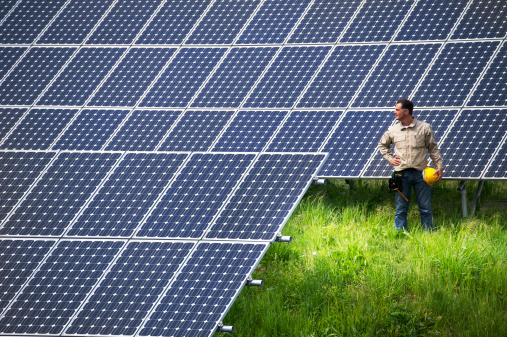Energy
Are Solar Energy Yieldcos Worth More Than Investors Think?
Published:
Last Updated:

While that may appear to be the case, Bloomberg New Energy Finance suggested otherwise in the 2015 version of its Sustainable Energy in America Factbook. The Bloomberg analysts note that while the primary use for oil remains as a transportation fuel, the growth of renewable energy sources like solar power has come in the utility sector and that the drop in oil prices could boost investments in renewable energy.
Bloomberg reports that U.S. investment in clean energy rose from $48 billion in 2013 to $52 billion in 2014. Only China, which invested $89 billion in 2014, sunk more investment into clean energy last year. Globally, clean energy investment rose to $310 billion, the second highest total on record, behind only 2011’s $318 billion.
And what gets the credit for the renewed investment in clean energy in the United States? According to Bloomberg:
The key drivers behind these numbers were: the brief window of renewed policy support for wind, the acceleration of the rooftop solar business; and the emerging phenomenon of ‘yieldcos’ (publicly listed companies that own operating renewable energy assets).
ALSO READ: 4 High-Flying Stocks That Have Sold Off Far Too Much
After peaking in early June, though, the yieldcos have tracked oil stocks down, with losses in a range of 11% to about 44%. But are investors missing something here? Here is a look at five yieldcos:
Abengoa Yield PLC (NASDAQ: ABY) was formed by Spain-based Abengoa in 2013 and has a market cap of $2.26 billion. The company pays a dividend yield of 6.8% and reported profits of $13.9 million ($0.17 a share) in its second quarter. Its struggling parent company is almost certainly the cause of the yieldco’s 44% share price drop, much of which has come in the past month or so as the parent has cut cash flow guidance and announced a rights issue valued at €650 million. Shares closed at $22.52 on Friday, and the consensus price target is $37.56, yielding an implied gain of nearly 67%.
NRG Yield Inc. (NYSE: NYLD) was founded in 2012 and is a subsidiary of NRG Energy Inc. (NYSE: NRG). It has a market cap of $2.23 billion and pays a dividend yield of 5.1%. When the yieldco reported second-quarter results, it not only missed estimates, but cut forward guidance due to low wind energy production and fewer leases on residential solar installations. Shares closed at $16.89 on Friday and have consensus price target of $25.38, indicating potential upside of 50%.
NextEra Energy Partners L.P. (NYSE: NEP) was formed in 2014 and is a subsidiary of NextEra Energy Inc. (NYSE: NEE). The yieldco’s market cap is $657 million and it pays a dividend yield of 3.1%. The company recently acquired Hawaiian Electric Industries for about $2.6 billion and has plans to expand renewable energy production in the state. NextEra Energy Partners also has agreed to buy a natural gas midstream company for about $2.1 billion. Share closed at $30.86 on Friday, and with a consensus price target of $43.08, the implied upside is nearly 40%.
TerraForm Power Inc. (NASDAQ: TERP) was spun out of SunEdison Corp. (NYSE: SUNE) last year, and it currently has a market cap of $3.18 billion and pays a dividend yield of 5.1%. As with the other yieldcos, TerraForm’s fortunes are tied in investors’ minds to the performance of its parent. In this case, SunEdison has been on a buying spree as it puts growth ahead of profits. The company paid nearly $2 billion for a wind energy company back in January and recently agreed to pay $2.2 billion for solar installer Vivint Solar Inc. (NASDAQ: VSLR). TerraForm’s stock closed at $25.50 on Friday, and the consensus price target is $41.00, implying potential upside of about 61%.
8point3 Energy Partners L.P. (NASDAQ: CAFD) is the most recently formed yieldco and is a joint venture of First Solar Inc. (NASDAQ: FSLR) and SunPower Corp. (NASDAQ: SPWR). The yieldco’s market cap is $315.4 million and it currently pays no dividend. It is probably too early in the company’s life to declare it either a success or a failure, but when First Solar reported quarterly results earlier this month, it noted that 8point3 contributed $284 million to its proceeds. The stock closed at $15.77 on Friday, and the consensus price target is $22.63, implying upside of 43.5%.
ALSO READ: Why Warren Buffett Continues to Dump His Exposure to Oil and Oil Stocks
None of these stocks is a value play, obviously. These are all growth plays, and the one with the best track record for growth is TerraForm, although one might wonder if growth for its own sake is a long-term winning strategy. NextEra’s yieldco has diversified with its purchase of a natural gas midstream player, and the acquisition of the Hawaiian energy company could be a solid win in that sunny state.
Thank you for reading! Have some feedback for us?
Contact the 24/7 Wall St. editorial team.